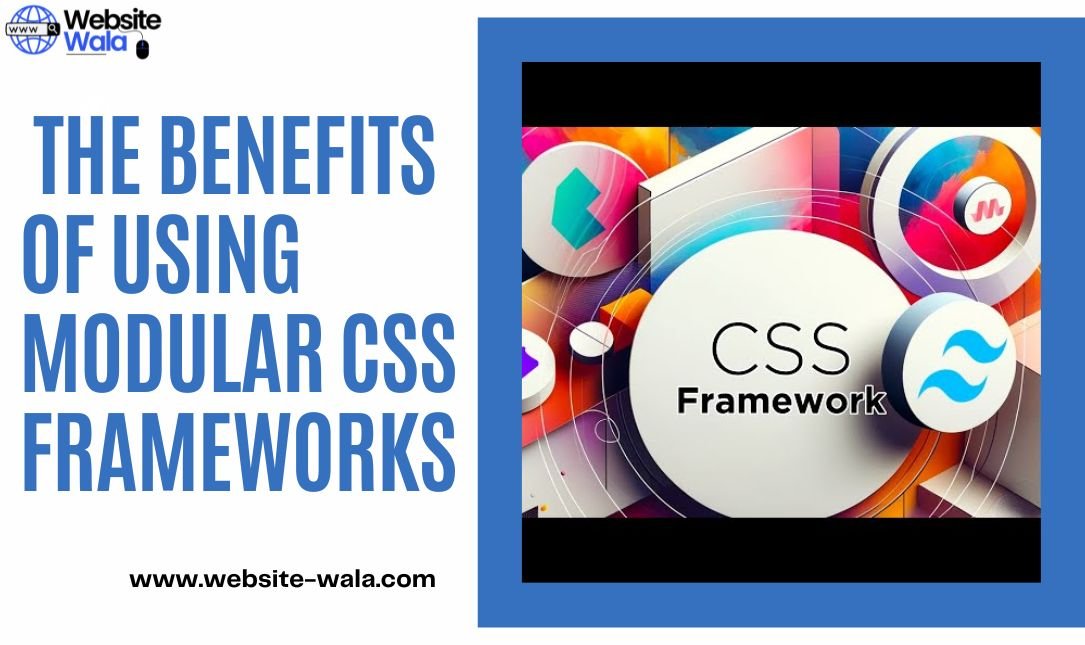
Discover the Benefits of Using Modular CSS Frameworks for better maintainability, scalability, and efficient web development in responsive web design.
Introduction to The Benefits of Using Modular CSS Frameworks
In modern web development, maintaining clean, efficient, and scalable code is crucial. One approach that has gained immense popularity is the use of modular CSS frameworks. Unlike traditional CSS, modular CSS breaks styles into reusable, self-contained components, making front-end development more organized and manageable. This article explores the key advantages of The Benefits of Using Modular CSS Frameworks, and why developers and designers are increasingly adopting this approach in web design.
What is Modular CSS?
Modular CSS is a design methodology where CSS styles are divided into small, reusable components. Each component is self-contained and can be integrated into different parts of a website without causing conflicts. This approach improves code organization and ensures consistency across large-scale projects. By using modular CSS, developers can focus on responsive web design and CSS architecture, creating a robust foundation for scalable web applications.
Enhanced Code Organization
One of the most notable The Benefits of Using Modular CSS Frameworks is improved code organization. Traditional CSS often leads to long, monolithic stylesheets that are difficult to maintain. In contrast, modular frameworks allow developers to structure CSS into smaller files, each representing a specific component or module. This organization makes it easier to locate, update, or remove styles without affecting unrelated elements, leading to cleaner front-end development workflows.
Improved Maintainability
Maintaining a large codebase can be a challenge in web development, especially when multiple developers are involved. The Benefits of Using Modular CSS Frameworks include enhanced maintainability, as modular components reduce duplication and minimize the risk of style conflicts. By isolating styles within components, developers can update a single module without unintentionally breaking other parts of the website. This modular approach also simplifies debugging and testing, making web design projects more efficient.
Scalability for Growing Projects
Another significant advantage of The Benefits of Using Modular CSS Frameworks is scalability. As websites and applications grow, managing traditional CSS becomes cumbersome. Modular CSS frameworks provide a scalable solution by enabling developers to add new components without rewriting existing code. This approach ensures that projects can expand seamlessly, supporting more features and complex layouts while maintaining a consistent visual style. Scalability is particularly beneficial for large front-end development teams working on enterprise-level applications.
Reusable CSS Components
A key feature of modular CSS frameworks is the ability to create reusable CSS components. These components can be shared across different projects or pages, significantly reducing development time. For example, a button, card, or navigation bar can be styled once and reused multiple times without duplication. This reusability not only enhances efficiency but also supports a consistent CSS architecture and strengthens responsive web design practices, ensuring that components adapt well across devices.
Consistency in Web Design
Consistency is a cornerstone of effective web design. One of the essential The Benefits of Using Modular CSS Frameworks is the ability to maintain a consistent look and feel throughout a website. Modular CSS enforces standard styles for components, making it easier to adhere to brand guidelines. This consistency is especially valuable in larger projects where multiple developers contribute to the same codebase, ensuring uniformity across all pages and sections.
Streamlined Front-End Development
Front-end development often involves collaboration between designers and developers. Modular CSS frameworks facilitate this process by separating style concerns into manageable units. Designers can work on individual components without affecting other modules, while developers can integrate these components seamlessly into the codebase. This collaboration leads to faster development cycles, reduced errors, and improved productivity—all of which are part of the The Benefits of Using Modular CSS Frameworks.
Better Responsive Web Design
Creating a responsive website that works across multiple devices is essential in today’s digital landscape. Modular CSS frameworks contribute significantly to responsive web design by providing pre-structured components that adapt to different screen sizes. Developers can create fluid grids, flexible layouts, and adaptable elements with minimal effort, ensuring a consistent user experience on desktops, tablets, and mobile devices. The modular approach makes it easier to maintain these responsive components as the website evolves.
Effective CSS Architecture
A robust CSS architecture is crucial for long-term project success. The Benefits of Using Modular CSS Frameworks include the ability to implement well-structured CSS architectures, such as BEM (Block Element Modifier), SMACSS (Scalable and Modular Architecture for CSS), or ITCSS (Inverted Triangle CSS). These architectures promote modularity, reusability, and maintainability, reducing technical debt and allowing developers to manage complex front-end development projects more efficiently.
Conclusion: Embracing Modular CSS Frameworks
In conclusion, The Benefits of Using Modular CSS Frameworks are substantial for modern web development and web design. By adopting a modular approach, developers can improve code organization, maintainability, and scalability, while creating reusable CSS components and maintaining consistent styling. Modular CSS frameworks support responsive web design, streamline front-end development, and provide a solid foundation for a well-structured CSS architecture. For teams and solo developers alike, embracing modular CSS frameworks is a strategic decision that enhances productivity, reduces errors, and ensures long-term project success.
Investing in modular CSS frameworks is not just a trend—it’s a practical approach that brings measurable advantages to any web project. From faster development cycles to cleaner code and better web design, the The Benefits of Using Modular CSS Frameworks make it a cornerstone of modern front-end practices.























